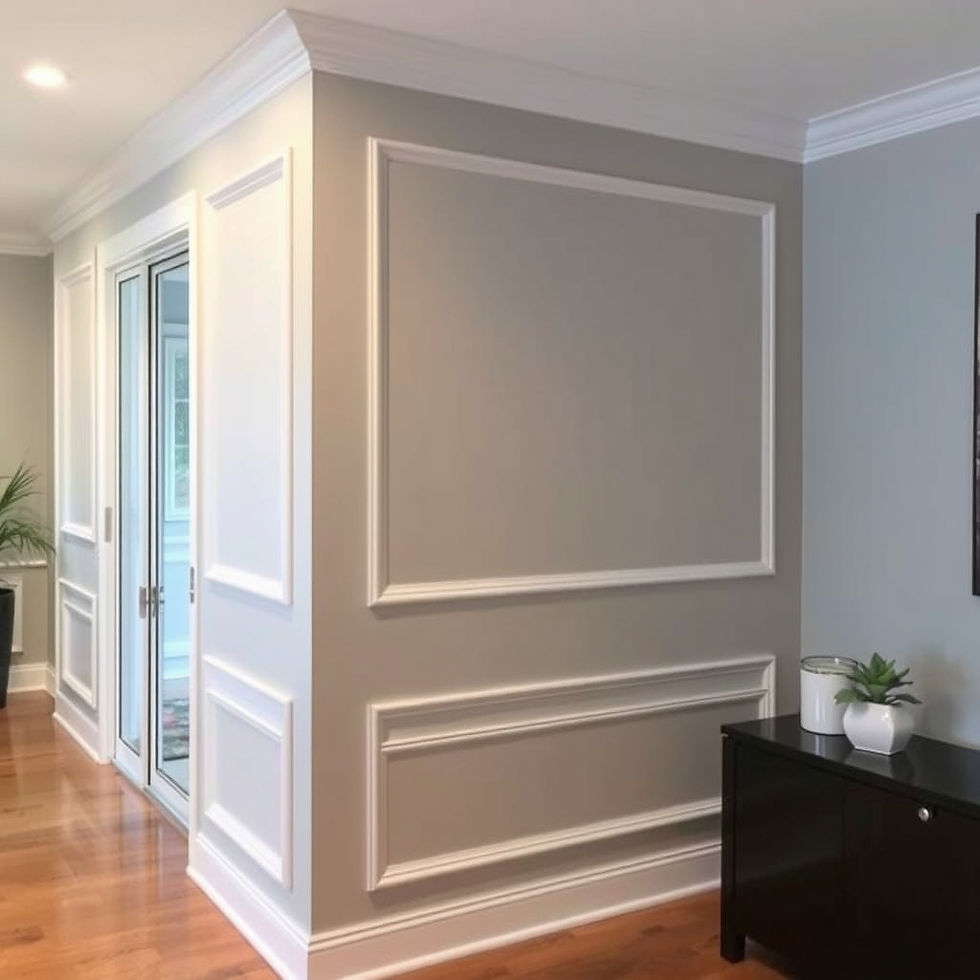Accent Wall with Molding
- Jayant Upadhyay
- Jul 15
- 4 min read

Accent walls have long been a go-to strategy in interior design for adding interest and personality to a space. One technique that’s both timeless and trending is the use of molding on accent walls. From traditional wainscoting to modern geometric trims, molding transforms a simple wall into a stunning architectural feature.
In this 3000-word DreamDen blog, we’ll explore various types of molding, design styles, DIY tips, color choices, and inspirational examples that prove an accent wall with molding isn’t just for historic homes—it's a powerful tool for any modern space.
Understanding Wall Molding: A Quick Overview
Molding (or moulding) refers to the decorative trim used to enhance the appearance of walls, ceilings, doors, and windows. When used on an accent wall, it introduces depth, structure, and a sense of refinement.
Types of Molding
Wainscoting: Wood paneling typically installed on the lower half of a wall.
Picture Frame Molding: Square or rectangular frames formed with trim pieces.
Board and Batten: Vertical strips (battens) overlaid on wide boards or drywall.
Chair Rail: A horizontal molding that traditionally protects walls from chair backs.
Crown Molding: Installed where the wall meets the ceiling for a finished look.
Geometric Paneling: Modern patterns like hexagons, diamonds, or grids.
Benefits of an Accent Wall with Molding
Architectural Interest
Molding adds dimension and visual weight to a wall, creating a focal point in any room.
Versatility
From ornate Victorian designs to minimalist square panels, molding works with any decor style.
Budget-Friendly Elegance
Pre-cut moldings and trim pieces are widely available and DIY-friendly.
Enhanced Resale Value
Elegant details like trimwork often appeal to homebuyers and add perceived value.
Best Rooms to Add a Molding Accent Wall
Bedroom
Frame the bed with symmetrical molding panels for a luxurious headboard effect.
Living Room
Create a dramatic TV wall with board-and-batten or picture frame molding.
Dining Room
Wainscoting paired with a chair rail adds timeless elegance.
Entryway or Hall
Small spaces benefit from added character and a tailored look.
Home Office
Panel molding lends sophistication and helps define a professional vibe.
Design Styles and Ideas for Accent Walls with Molding
1. Classic Picture Frame Molding
Evenly spaced rectangular frames on a painted wall.
Use monochromatic colors for a subtle effect.
Ideal for traditional and transitional spaces.
2. Modern Grid Paneling
Create a grid of squares or rectangles using thin trim.
Paint the entire wall and molding one bold color like navy or emerald.
Perfect for contemporary or Scandinavian interiors.
3. Board and Batten Charm
Vertical slats spaced evenly across the wall.
Works great in farmhouse, rustic, or coastal styles.
Can be installed at full or half-wall height.
4. Half-Wall Wainscoting with Wallpaper
Combine white wainscoting below and bold wallpaper above.
Adds texture and visual interest.
Great for powder rooms, nurseries, or eclectic living rooms.
5. Picture Frame with Accent Colors
Paint the inside of each molding frame a different shade for a pop-art feel.
Add wallpaper or fabric inside the panels for a gallery effect.
Color and Finish Options
Monochromatic Elegance
Paint the trim and wall the same color for a subtle yet dimensional effect.
Bold Contrast
Use white molding on a dark wall or vice versa for high visual impact.
Natural Wood Accents
Stain wood trim to showcase natural grains and pair with white or neutral walls.
Metallic Touches
Use gold, brass, or matte black molding for a glamorous or industrial touch.
How to Plan Your Molding Layout
Step 1: Choose Your Wall
Select the wall that draws the eye naturally—usually behind the bed, sofa, or TV.
Step 2: Measure and Sketch
Measure your wall and sketch the layout on paper. Symmetry is key for traditional designs.
Step 3: Select Molding Type and Size
Thicker moldings create a bolder look; thin moldings suit modern designs.
Step 4: Decide on Paint or Stain
Consider how the finish will contrast or blend with your room decor.
Tools and Materials Needed
Trim or molding pieces (MDF or wood)
Miter saw or hand saw
Measuring tape and level
Nail gun or finishing nails
Caulk and wood filler
Sandpaper
Primer and paint or stain
DIY Guide: Installing Molding Accent Walls
Step 1: Prep the Wall
Clean the surface and remove any nails or screws
Mark stud locations if nailing directly to drywall
Step 2: Cut Molding to Size
Use a miter saw for clean, angled corners
Dry-fit before attaching to ensure accurate placement
Step 3: Attach Molding
Apply wood glue to the back
Nail in place with a nail gun or finishing nails
Step 4: Fill and Sand
Fill gaps and nail holes with wood filler
Sand smooth for a seamless finish
Step 5: Paint or Stain
Prime if necessary, then apply your chosen finish
Allow to dry fully between coats
Budget Tips
Use MDF trim for an affordable alternative to wood
Check for discounts at hardware stores
Rent tools like miter saws instead of buying
Start with one accent wall before committing to a larger project
Mistakes to Avoid
Ignoring Scale
Tiny moldings on large walls can feel underwhelming; choose the right proportions.
Poor Planning
Measure twice, cut once! Improper layout can lead to uneven spacing.
Not Using a Level
Even a slight tilt will be very noticeable with geometric patterns.
Skipping Prep
Always clean, fill, and sand before painting for a professional result.
Popular Color Pairings
Navy Blue + White Molding
Sage Green + Natural Oak Trim
Black Wall + Brass Molding
White Wall + Gray Trim
Forest Green + Matte Gold
Case Study: DreamDen Client Makeover
Client: Suburban couple with modern farmhouse aesthetic
Goal: Add architectural detail to their master bedroom
Solution:
Installed board and batten behind the bed
Painted entire wall a rich charcoal gray
Added white bedding and brass sconces
Result:
Cozy yet sophisticated vibe
Elevated the room’s style without major renovation
How to Maintain a Molding Accent Wall
Dust regularly with microfiber cloth
Wipe with damp cloth for fingerprints or stains
Touch up paint as needed to keep lines crisp
Final Thoughts: Timeless Appeal, Customizable Style
An accent wall with molding is more than a decorative upgrade—it’s a statement of style, structure, and elegance. Whether you're aiming for modern minimalism or traditional charm, molding lets you personalize your space in a way that flat paint simply can’t achieve.



Comments